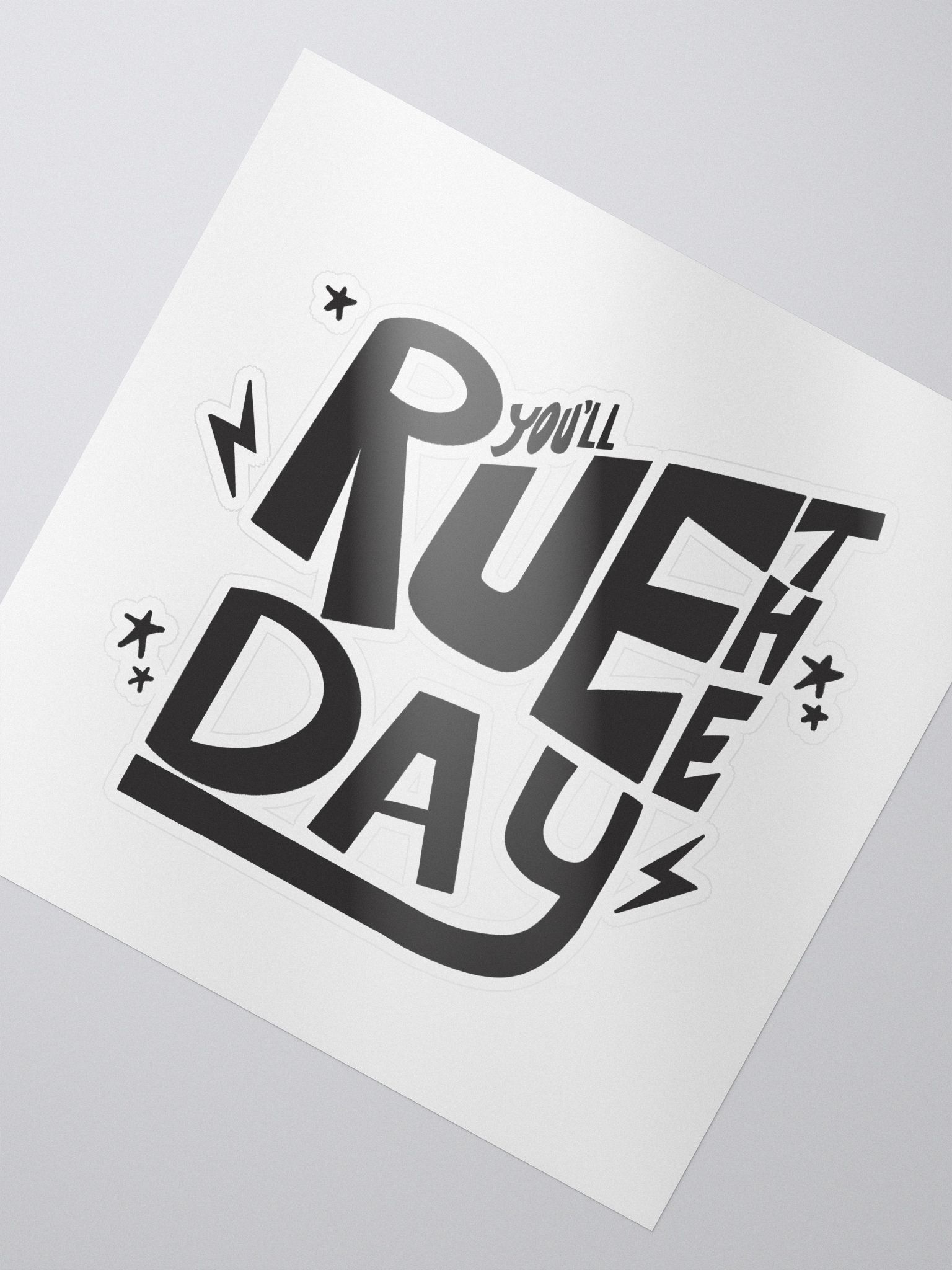You've probably heard the phrase "you'll rue this day" tossed around in movies, books, or even in real-life arguments. It's one of those dramatic lines that carries so much weight, it feels like a prophecy. But what exactly does it mean? Why does it resonate so deeply with us? And how can understanding its power help us navigate conflicts and relationships more effectively?
Let's face it, life is full of moments where emotions run high, and words are thrown around like grenades. "You'll rue this day" isn't just some random phrase—it's a warning shot, a verbal time bomb set to explode in the future. But before we dive into the nitty-gritty, let's take a step back and explore why this phrase has become such a powerful tool in human communication.
In today's fast-paced world, where everyone's attention span is shorter than a goldfish's, mastering the art of impactful language is crucial. Whether you're a writer, a public speaker, or just someone trying to get your point across, knowing how to use phrases like "you'll rue this day" can make all the difference. So buckle up, because we're about to break it down for you in a way that's both informative and, dare I say, kinda fun.
- Is Danny Devito A Midget Separating Fact From Fiction
- Joseph Joestar Cosplay A Comprehensive Guide For Enthusiasts
What Does "You'll Rue This Day" Really Mean?
At first glance, "you'll rue this day" might sound like something out of a Shakespearean play, and you wouldn't be far off. The word "rue" actually comes from Old English and Middle English, where it meant to regret or feel sorrow over something. So when someone says "you'll rue this day," they're essentially telling you that you'll deeply regret whatever decision or action you're taking right now.
Think about it—how often have you heard someone use this phrase in a heated argument? Maybe it was a parent to a rebellious teenager, a boss to an employee who crossed the line, or even a friend who felt betrayed. The phrase is so powerful because it taps into our primal fear of consequences. Nobody likes the idea of regret, and that's exactly why it hits so hard.
Breaking Down the Word "Rue"
To truly understand "you'll rue this day," we need to unpack the word "rue" itself. In modern English, "rue" is rarely used outside of this phrase, but it has a rich history. Back in the day, "rue" was often associated with regretting actions that couldn't be undone. For example, if someone made a terrible mistake, they might say, "I rue the day I did that." Sound familiar?
- Berkley Jensen 5 Burner Gas Grill The Ultimate Grilling Experience
- Ashley Inked The Ultimate Guide To Her Inspiring Journey Inked Adventures And More
Here's a quick breakdown:
- "Rue" = to regret deeply
- "This day" = the present moment or decision
- "You'll" = a contraction of "you will," indicating a future event
Put it all together, and you've got a phrase that's basically saying, "In the future, you're going to look back on this moment and wish you'd done something differently." Oof, right?
Why Is This Phrase So Powerful?
Now that we know what "you'll rue this day" means, let's talk about why it's such a potent weapon in the world of language. Words have power, and this phrase is no exception. It's not just a random collection of syllables—it's a carefully crafted statement designed to evoke emotion and create impact.
First off, the phrase plays on the universal fear of regret. Who hasn't looked back on a decision and thought, "What was I thinking?" Regret is one of those emotions that lingers long after the moment has passed, and "you'll rue this day" taps directly into that fear. It's like a verbal boomerang that comes back to haunt you later.
Secondly, the phrase is dramatic as hell. There's something inherently theatrical about saying, "You'll rue this day." It's the kind of line that villains in movies love to throw around before they unleash their master plan. And let's be real—drama sells. Whether it's in literature, film, or real life, people love a good dramatic moment, and this phrase delivers in spades.
The Psychology Behind the Phrase
From a psychological perspective, "you'll rue this day" is pure genius. It combines two of the most powerful motivators in human behavior: fear and regret. Fear keeps us from taking risks, while regret makes us second-guess our decisions. By using this phrase, you're essentially hitting someone with a double whammy of emotional manipulation.
But here's the thing—it's not all bad. While the phrase can be used to control or manipulate, it can also serve as a wake-up call. Sometimes, we need that slap in the face to realize the consequences of our actions. And if used responsibly, "you'll rue this day" can be a powerful tool for encouraging self-reflection and growth.
Historical Context: Where Did It Come From?
Like many phrases we use today, "you'll rue this day" has its roots in history. While it might seem like a modern invention, it's actually been around for centuries. The earliest recorded use of the word "rue" in English dates back to the 14th century, and it was commonly used in literature and poetry.
One of the most famous examples comes from Shakespeare's "Romeo and Juliet," where the Nurse says, "I rue the day I ever gave thee suck." Talk about dramatic! Shakespeare was a master of language, and he knew how to use words to evoke emotion. By incorporating "rue" into his plays, he tapped into a universal human experience that still resonates with us today.
Modern Usage: How Has It Evolved?
While the phrase "you'll rue this day" has remained relatively unchanged over the years, its usage has evolved with the times. In the past, it was often used in formal settings, such as legal proceedings or royal decrees. Today, it's more likely to be heard in casual conversations or pop culture references.
For example, in the hit TV show "Game of Thrones," characters frequently use dramatic lines like "You'll rue the day you crossed me!" It's become a staple of the show's dialogue, adding to its epic, larger-than-life feel. And let's not forget the countless memes and parodies that have sprung up around the phrase. In the age of the internet, nothing is sacred, and "you'll rue this day" is no exception.
When Is It Appropriate to Use "You'll Rue This Day"?
Now that we've explored the meaning and history of the phrase, let's talk about when it's appropriate to use it. While "you'll rue this day" can be a powerful tool, it's important to use it wisely. After all, words have consequences, and throwing this phrase around willy-nilly could backfire on you.
Here are a few scenarios where using "you'll rue this day" might be appropriate:
- When someone is making a decision that could have serious consequences
- When you want to emphasize the gravity of a situation
- When you're trying to make a point in a dramatic or impactful way
On the flip side, there are times when using this phrase might not be the best idea. If you're in a heated argument and emotions are running high, throwing out a line like "you'll rue this day" could escalate the situation. Instead, try to focus on constructive communication and finding a resolution.
Alternatives to "You'll Rue This Day"
If you're looking for alternatives to "you'll rue this day," there are plenty of other phrases that can convey a similar message without coming across as too dramatic. Here are a few options:
- "You might regret this later"
- "Think twice before you do that"
- "This could come back to bite you"
These alternatives still carry weight, but they're a bit more subtle and less likely to escalate a situation. It's all about finding the right balance between impact and tact.
How to Avoid Regret in Your Own Life
While "you'll rue this day" is a great phrase for emphasizing consequences, it's also a reminder to live your life with intention. Regret is a powerful emotion, and while it can be a motivator, it's not something you want to carry around forever. So how can you avoid regret in your own life?
Here are a few tips:
- Make decisions based on values, not emotions
- Take time to reflect on your choices before acting
- Learn from your mistakes and move forward
At the end of the day, life is all about choices. While we can't control everything that happens to us, we can control how we respond. By making conscious, intentional decisions, you can minimize the chances of regret and live a more fulfilling life.
Embracing the Power of Regret
Believe it or not, regret can be a positive force in your life. While it might not feel great in the moment, it can serve as a powerful teacher. Every mistake you make is an opportunity to learn and grow, and every regret is a chance to do better next time.
So the next time someone says "you'll rue this day," take a moment to reflect. Is there something you can learn from the situation? Can you use this moment as a stepping stone to a better future? The answer might surprise you.
Conclusion: The Last Word on "You'll Rue This Day"
So there you have it—a deep dive into the world of "you'll rue this day." From its historical roots to its modern usage, this phrase has proven to be a powerful tool in human communication. Whether you're using it to emphasize consequences, make a dramatic point, or simply add some flair to your conversations, "you'll rue this day" is a phrase that's sure to leave an impact.
But remember, with great power comes great responsibility. While "you'll rue this day" can be a useful tool, it's important to use it wisely. Focus on constructive communication, learn from your mistakes, and live your life with intention. After all, the last thing you want is to rue your own words someday.
Now it's your turn! Have you ever used "you'll rue this day" in a conversation? Or maybe someone has said it to you? Share your thoughts in the comments below, and don't forget to check out our other articles for more insights into the power of language. Until next time, stay curious and keep learning!
Table of Contents
- Jason Kelce And Quinta Brunson The Dynamic Duo Of Football And Entertainment
- Gus The Bass The Ultimate Guide To Discovering The Iconic Music Maestro


